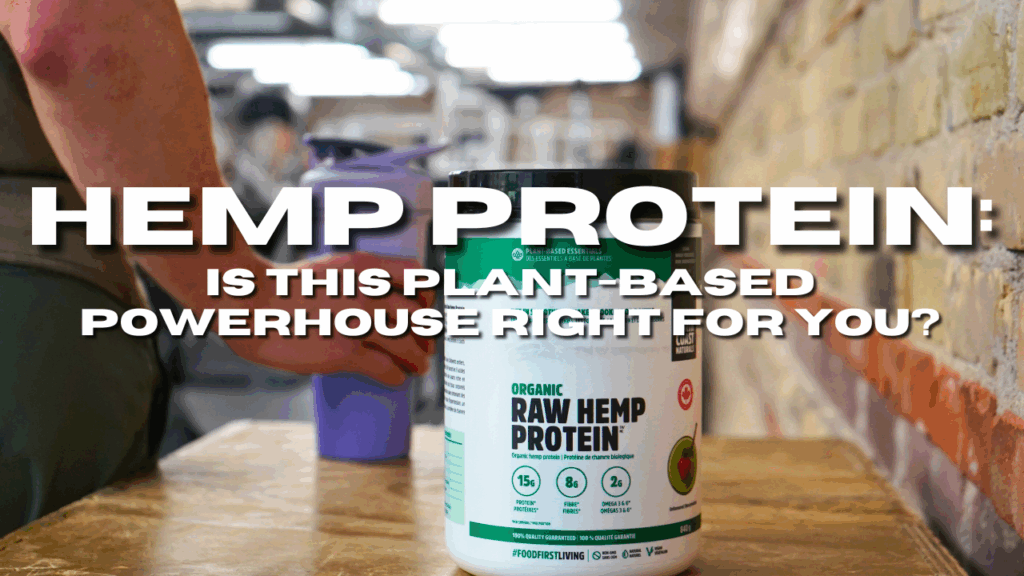
If you’ve ever stood in the supplement aisle staring at tubs of protein powder—whey, soy, pea, rice, hemp—you’re not alone.
Most exercisers know protein is essential for recovery, muscle repair, and performance, but the variety of options can be overwhelming.
Today, we’re putting the spotlight on hemp protein—what it is, how it stacks up against whey and other proteins, and why it might (or might not) be the right choice for your training and nutrition goals.
What Is Hemp Protein?
First things first—it’s not what you think.
Hemp protein powder comes from the seeds of the hemp plant (Cannabis sativa), but it’s not marijuana and it definitely won’t get you high. The psychoactive compound THC (tetrahydrocannabinol) is found in the flowers and leaves of certain cannabis varieties—not in the seeds used for hemp protein. In fact, hemp seeds naturally contain only trace, non-psychoactive amounts of THC (well below the legal 0.3% threshold in Canada and the U.S.), so the only thing you’ll feel after drinking a hemp shake is full—not “stoned.”
Hemp protein is made from the seed meal that remains after hemp seed oil is pressed. This meal is milled into powder, and depending on processing, it may be:
- Whole hemp protein powder – minimally processed, retaining fiber and some healthy fats.
- Hemp protein concentrate/isolate – filtered to increase protein percentage and reduce fiber.
Hemp’s main storage proteins are edestin and albumin, both considered easily digestible compared to some other plant proteins (House et al., 2010).
Hemp vs. Whey vs. Other Plant Proteins
When choosing a protein, two key factors matter most:
- Protein density per serving (how much protein you get in a scoop)
- Protein quality/bioavailability (how much of that protein your body can actually use)
Here’s how hemp compares:
| Protein Type | Protein per 30g serving (avg) | PDCAAS* | DIAAS† | Limiting Amino Acid |
| Hemp | ~15g | 0.46–0.66 | <75‡ | Lysine |
| Whey Isolate | 25–27g | 1.00 | 1.09 | None |
| Soy Isolate | 23–25g | 0.98–1.00 | ~0.90 | None |
| Pea Protein | 20–23g | 0.80–0.90 | ~0.82 | Methionine/Cysteine |
*PDCAAS: Protein Digestibility-Corrected Amino Acid Score (FAO/WHO method, max 1.0)
†DIAAS: Digestible Indispensable Amino Acid Score (newer, more precise method)
‡Exact DIAAS values vary by processing method.
Key takeaway: Whey tops the chart for quality and digestibility, soy and pea do well, and hemp—while complete—scores lower because it’s low in lysine.
References:
- House, J.D. et al. (2010). Evaluation of the protein quality of hempseed (Cannabis sativa L.) protein concentrate. J. Agric. Food Chem. 58(22), 11801–11807.
- Gorissen, S.H. et al. (2018). Protein quality as determined by the Digestible Indispensable Amino Acid Score: evaluation of ten different protein sources. Nutrients, 10(11), 1841.
Bioavailability: Can Your Body Use Hemp Protein Efficiently?
Hemp protein’s PDCAAS score (0.46–0.66) means your body uses roughly half to two-thirds of the essential amino acids compared to top-tier proteins like whey (PDCAAS 1.00).
Its limiting amino acid is lysine—without enough of it, muscle protein synthesis is less efficient.
The good news: Combining hemp with another protein source high in lysine (like pea or whey) significantly boosts its quality score (Tang et al., 2009).
Benefits of Hemp Protein
Even with a lower bioavailability than whey, hemp offers unique advantages:
- Whole-food nutrition – Naturally contains fiber (7–10g per serving in whole hemp powder), omega-3 fatty acids, and minerals like magnesium and iron.
- Satiety – Fiber slows digestion, keeping you fuller for longer—great for weight management.
- Gut health support – The fiber acts as prebiotic fuel for beneficial gut bacteria.
- Allergen-friendly – Free from dairy, soy, and gluten (check labels for blends).
- Sustainability – Hemp crops grow quickly, require less water, and provide both oil and protein co-products.
Who Hemp Protein Is For (and Who It’s Not For)
Best for:
- Plant-based eaters wanting a minimally processed, nutrient-rich protein source.
- Those with dairy or soy allergies.
- Clients focusing on satiety and balanced nutrition rather than maximum anabolic response.
Not ideal for:
- Athletes chasing maximum muscle protein synthesis per scoop (whey, soy, or blends will do better).
- People needing 25–30g of high-quality protein in one quick shake without extra calories from fiber/fats.
How to Make Hemp Protein Work for You
If you love hemp’s whole-food benefits but want to optimize its muscle-building potential:
- Blend for completeness – Mix hemp with pea or whey to fill its lysine gap.
- Match to your goal –
- Whole hemp powder → best in smoothies for satiety & nutrient boost.
- Hemp concentrate/isolate → better for quick post-workout absorption.
- Dose smartly – Aim for ~0.3g protein/kg bodyweight per feeding. With hemp, that usually means a slightly larger scoop or a blended mix.
Bonus: Quick Blend Recipes
For Vegan Athletes: Hemp + Pea Power Shake
- 20g hemp protein
- 15g pea protein
- 300ml almond milk
- 1 banana
- 1 tbsp almond butter
- This blend provides ~27g protein with a balanced amino acid profile and ~4g fiber—ideal for post-training recovery.
For Flexitarians: Hemp + Whey Recovery Blend
- 15g hemp protein
- 20g whey isolate
- 300ml water or milk of choice
- ½ cup frozen berries
- Delivers ~33g high-quality protein, combines hemp’s micronutrients with whey’s bioavailability for optimal muscle repair.
The Bottom Line
Hemp protein isn’t the highest-scoring protein in terms of bioavailability—but it shines as a nutrient-dense, plant-based, allergen-friendly option with extra fiber and healthy fats.
For best results, blend it with complementary proteins to maximize its amino acid profile, especially if you’re training hard and aiming for optimal recovery.
If you’re looking for a protein powder that nourishes beyond just protein numbers—hemp might be exactly what your shake is missing.